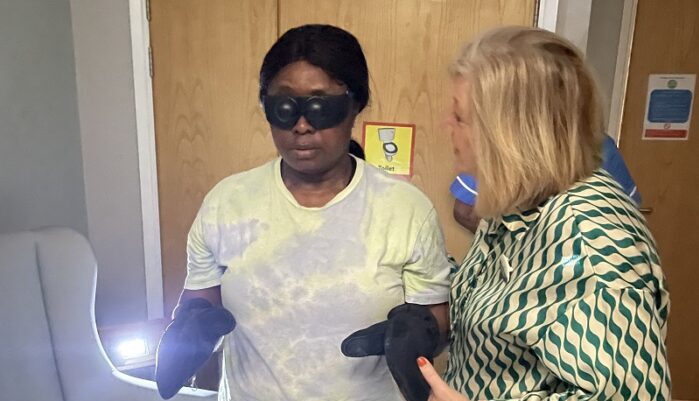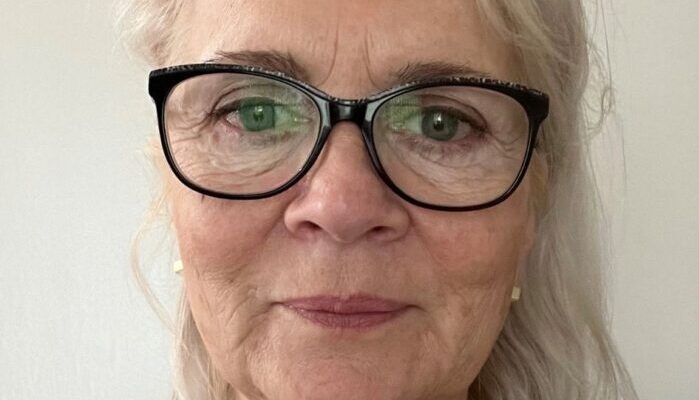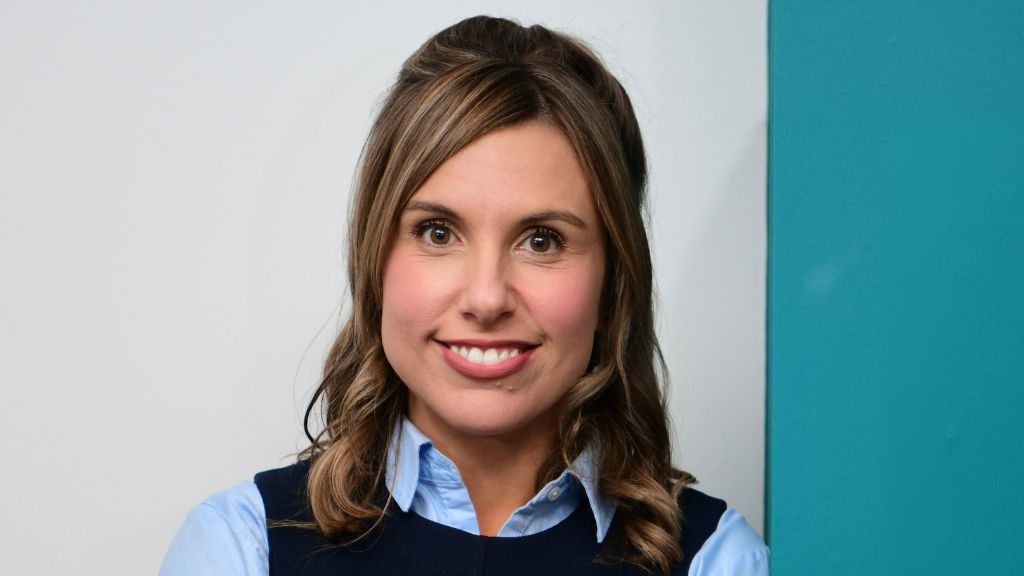Caring Times on the road: Loveday Kensington
This month, Caring Times editor Anna Dobbie visited a stunning new build development in Belgravia. Directly opposite London’s oldest garden square, this elegant residence is only a short stroll from Kensington High Street, Kensington Palace and Hyde Park.

Loveday Kensington was designed by the recognised world leader in senior living architecture and interior design, Australia-based Marchese Partners. Forty suites of varying sizes and styles are situated over four floors. Several suites have private courtyards or terraces.
A spectacular rooftop terrace café overlooks Kensington Square Garden, with guests also able to enjoy an elegant cinema and library room, a luxurious spa and beauty salon and a dedicated studio and activities room. The property’s interiors have a warm colour palette, and designs blend classical, mid-century and contemporary styling, enhanced by luxurious textiles and American walnut furniture.
After touring the property, I sat down for a lovely three-course meal prepared by the home’s award-winning chefs, to chat with Loveday and Co’s director of wellbeing and dementia Gabriela Zackova. With more than 20 years’ nursing experience, spanning acute, senior and palliative care, Zackova opened Loveday Chelsea Court Place as general manager and has overseen the development of ‘The Loveday Way’ – a unique blend of care and hospitality, as well as being responsible for domiciliary care and lifestyle membership service, Loveday at Home.
The building at Kensington was completed in last December and opened its doors in February. “You don’t realise it, but everything kind of comes at once, so the dining room was not the way it looks now,” she said of the moving-in process. “There was no furniture but it was full of boxes of pads, clinical equipment, housekeeping trolleys, pillows duvets.” With three more London homes, in Notting Hill, Abbey Road and St John’s Wood opening shortly, it is a process she will soon be an expert at.
Zackova started at Loveday with a view to progress: “It was quite a hard job to get for some reason because people tend to employ people they’ve met before or they know. My manager left in early 2019, so I’ve got involved in lots of stuff that I wouldn’t have before. Getting to understand the business and building a care home from scratch was exciting as well.”
Building the home allowed Zackova to have a formative impact on the way it was designed and run. “It’s always important to me in any care home that it is not institutional, and that we don’t make assumptions about people,” she said.
“I get into arguments because people say ‘Chelsea Court Place isn’t dementia-specific. You haven’t got different coloured toilet seats, you haven’t got big signs’. People have lived there for five years and if people need adaptations made with time, we’ll do that, but I don’t want to build with the assumption that everyone will be living with dementia, blind or hard of hearing because they’re old. What we wanted was a blank canvas of a home that can meet the needs of anybody, but has lots of little adaptations hidden in the construction. For example, in the bathrooms, you can have handrails, but you can also take them out and hide them well in a wall if somebody doesn’t want them. The bathroom has sensors and acoustic monitoring that you can use but you don’t have to if it’s not needed.”
However, Zackova (a CQC inspector herself), was frustrated that at the home’s opening inspection ‘red toilet seats’ were brought up. “I think that’s just misinterpreted research. Colour contrast is really important but it doesn’t have to be red. If you have a white toilet bowl, you can have a greyish toilet seat, so that it’s easy to see. Once in a while, you may have a member who likes a darker seat and then you can add that in. You design for people who have the most capabilities and then add in extra features to suit their needs as opposed to everybody having stuff they might not need.
“In some care homes, you have names on the door, which I just hate. I used to be guilty of this; we used to admit someone into a care home and print their name and put it on the door, but then I started thinking ‘Oh, gosh, would I want my name on the door? Are we asking people if they want their name on the door?’ At Loveday, it’s more about doing a really good assessment before people move in and finding out from the members themselves or their loved ones. What is it they would want? What are they like –are they private? That will affect the room we might choose for them and what sign we put on the room.
“We’ve come up with a cool method of room recognition in Chelsea Court Place. We’ve worked with families and asked if they have anything the member would have been looking at every day. One lady has a photograph on her door of the view from her flat in Hong Kong. She still recognises it because that’s what she looked at every day for 30 years. It’s just getting to know the member and finding out what works for them, rather than presenting them with a done room and saying ‘this is how it’s got to be’. It’s about accommodating their needs rather than making them fit our brand standards.”
With 18 years of experience and through her work with the CQC, Zackova has visited a lot of homes and has observed that the main difference between a good and bad home is not the facilities but the quality of care.
“Just imagine you’ve become dependent on someone to do your daily routine for you and how much time that person would need to spend with you to do everything that you’re used to, from giving you your shower in the morning to doing your makeup, doing your hair the way you wanted, putting on your jewels, the clothes that you choose – it just can’t all be done in 15 minutes, either in a care home or providing home care, where sometimes the carers do only have 15-minute visits with people. In 15 minutes, you can only provide the basics to keep someone alive – it’s not personal. People talk about ‘person-centred care’ and it’s a lovely term, but is it actually what’s being delivered across the centre? I think people are a bit scared because when you talk about that in some companies, it almost sounds like you’re complaining about the company or saying that the care home is not being well run.”
But can tech reduce the amount of time required with carers? “We’ve been pitched some software and the headline was ‘we can reduce your staffing by 40%, and it will save you this much money’. What we’re trying to do is enhance what we offer. A lot of admin comes with care, so the aim is to reduce admin time and spend more time with the members. If you can record something on a device that will take you five seconds because you click a couple of icons, rather than having to go to a room, find someone’s file, or find the right page, that’s great. What we’re trying to do is enhance the experience for the members because they’ll get more of our time, and you will get better recording anyway because it’s all time-stamped and people learn to record things in real-time, rather than going back trying to remember what the member had for lunch. You get much better-quality records, and less admin, so I think, once people get used to it and get trained and mentored to use the software, then they recognise it makes their jobs easier.”
Zackova acknowledges that with the cost of living increases, it’s a hard time to increase spending: “It all goes back to funding and time, and investing that time in people to help them learn, which we’re fortunate that we can do here. I’m so passionate about trying to change this for everyone if I can, somehow. I haven’t got a plan yet, but it needs to change.”
Inspired by a friend, she joined the CQC in 2016: “I thought that I’d love to go to homes and see how they work, what they’re doing and share learning. I had this naive idea that people can work together and it can be more of a collaboration between the regulator and the service. It’s slowly getting there. It’s less of a one-day inspection and more of a keep-in-touch situation.”
Although inspections were on hold during Covid-19, Zackova is excited to have been recently assigned some more.
“What I’ve learned is that it’s lovely to have a nice new-build home where you can put in all the tech, but I’ve been through a lot of homes over the years, and I’ve learned it’s really about the people.
“You have some really lovely properties that are just not very well cared for. I always say to people, you walk in and just take the atmosphere in. I’ve been to a home that was so lovely and had a beautiful dementia wing and it was all really impressive, but I just couldn’t shake the feeling everyone was very unhappy. Not the residents as such, but the team, because everyone we passed was looking down, and I thought ‘that’s odd that no one says hello, or just engages’. It’s the atmosphere of the home that matters most.”
So, what makes Loveday stand out? “For me, it was the fact that it was a start-up. Many of my friends thought I was completely nuts – ‘you probably won’t even get paid; it’s too small’. I always had this idea of ‘why can’t we do things better?’ and some of it requires money, but some of it, not really. It’s just how you do things. What an amazing opportunity for me to come into a company that is a bit of a blank canvas, and that’s growing, where I can implement things that I always wanted to without facing a lot of red tape.
“When you’re in a big organisation, you have to go through head office and then, if they implement something, they tend to do it across all the homes; it’s tough to make any changes. I thought I might be able to do it here. As soon as I joined, I thought ‘yeah, I think they’re open to hearing me out’ which is great. You don’t get that in every organisation you work for.
It’s exciting that we’ve got investors on board and have started building more homes. I never really could do that as a nurse or a deputy, you focus more on care and clinical stuff. At Chelsea Court Place, we did everything together. I learned so much about how the business works, how people are invoiced, and how people are paid, plus PR and marketing, which I’d never done before. It’s fun because you get to do different things almost daily. It’s such a small team, everyone works together to get the job done. It’s not like, ‘I’m above that, that’s your job’. There have been times when senior management is helping out because the dishwasher is broken. No job is too big or too small, it’s very collaborative.”
Zackova recalls a day when the housekeeper phoned in sick but investors were due to view the property: “I was mopping, I was sweaty, and they came early. I threw the mop, sprayed myself with Chanel, and said ‘Hi. I’m Gaby, nice to meet you’. Obviously, if one of the members needs something, you drop what you’re doing, otherwise, you’re in the wrong job.”
Despite studying for a law degree around her nursing job, Zackova is not tempted to leave the field: “I thought about being a barrister, but it’s probably quite boring compared to my job in healthcare. I think Law helps you, because, when you work in healthcare when you become a registered manager, you’re legally obliged to do certain things, and when the law and guidance come out, you can interpret pretty much anything and understand it most of the time. I think understanding the law behind what you do is helpful in any job in any sector.”
As director of wellbeing, Zackova’s approach to empowering her staff is as person-centred as her care.
“I think it’s just about accepting each other, understanding each other’s strengths and weaknesses,” she added, explaining that while some may be empowered by connecting over an evening out, others may prefer to be taken for a team lunch. “I want everyone to feel like there is leadership, but that it’s not above them, that it is accessible, and that they can call me anytime, text me, that we can go out if they prefer to have a chat outside the home.”
Zackova also tries to make staff feel valued and explore their future potential: “During our supervisions, I would say ‘I think you’re great at this, have you thought about a career in this?’ Then we started doing apprenticeships and putting people through courses and saw them blossom. It’s a home where people stay – they’re not looking for other jobs.
“The other brilliant thing is staff progression; it’s showing people that actually they can have an amazing career. 70% of people that were with us when we first opened Chelsea Court Place have stayed; we have amazing retention. Some people started in reception and are now doing finance in the head office. Everyone is supported and given the training and tools to be the best versions of themselves and progress up the ladder.”
With more Loveday homes set to open imminently, I look forward to seeing how the business develops



